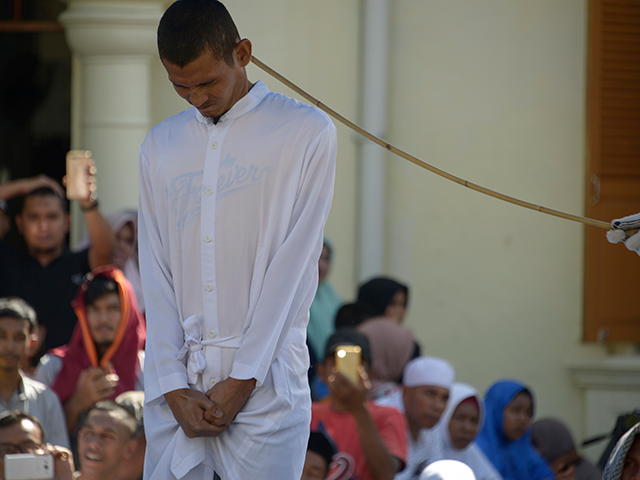Indonesia’s largest Muslim clerical body, the Indonesian Ulema Council (MUI), held a meeting of Islamic organizations in Jakarta on Tuesday to discuss solutions to the “problem” of gays and lesbians.
Homosexuality is not presently illegal in Indonesia – except for the fundamentalist Aceh province, which is governed under strict Islamic law, and periodically beats suspected gay people with canes. The MUI wants to criminalize it and has issued a fatwa declaring same-sex relations haram (forbidden).
According to a report from Coconuts Jakarta, the summiteers agreed that homosexuality should be made illegal under Indonesia’s secular Criminal Code, which will come up for revision in Parliament in July. A previous effort to criminalize homosexuality failed in 2017.
MUI Chairman Cholil Nafis claimed LGBT individuals could “destroy the nation’s character.” He described homosexual behavior as though it were a contagious disease.
“Even if [the presence of] LGBT do not directly affect other individuals, their impact is actually greater in that they can destroy the nation’s character."https://t.co/TxYzjXWYj2
— Coconuts Jakarta (@CoconutsJakarta) June 2, 2022
“Aside from rejection, we also want to cooperate with other parties to rehabilitate people who contract LGBT. We want to involve clerics, psychologists, as well as several hospitals to help those with wrong orientations and straighten them out,” Nafis said.
The Indonesian parliament has considered, and rejected, legislation that would force homosexuals to undergo “rehabilitation” administered by Muslim clerics. Supporters of this legislation made the same argument as Nafis that same-sex relationships “disrupt the future of mankind,” so they should be criminalized, and gay people should have no expectation of privacy.
The Indonesian government summoned the British ambassador last week to complain about the hoisting of a gay pride flag over the British embassy. A powerful Muslim organization called the Alumni 212 Brotherhood said the flag insulted the “sacred values of Indonesia.”
“The foreign ministry reminds foreign representatives to be respectful of the sensitivities among Indonesians on matters relevant with their culture, religion and belief,” a spokesman for the Indonesian foreign ministry said.

COMMENTS
Please let us know if you're having issues with commenting.